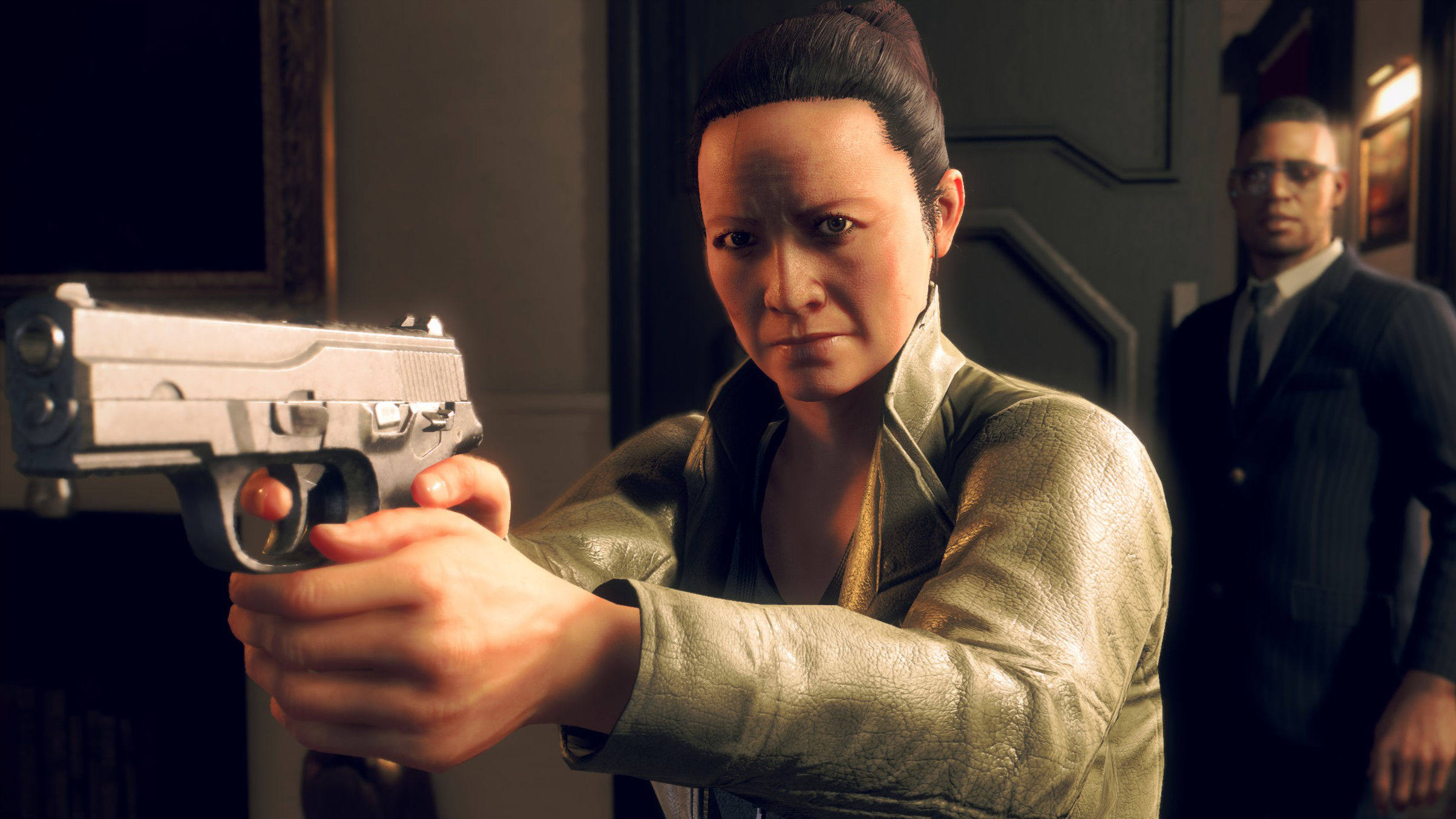Our Verdict
Playing as anyone works great in Legion—once you've finally found the right group of anyones.
PC Gamer's got your back
Above: Watch our Watch Dogs Legion review with accompanying gameplay footage.
A couple hours into Watch Dogs Legion I look at my small team of DedSec agents and think to myself: These people suck. The concept seems sound—rather than playing a traditional protagonist, you recruit a team of heroes from randomly generated, ordinary citizens of London. The problem with ordinary people, though, is that they're ordinary. I have a filmmaker on my team. An ambulance driver. A legal assistant. A lady whose only skill is that she owns a car.
What is it? An open world action stealth game set in a dystopian future London
Expect to pay: $60/£55
Developer: Ubisoft
Publisher: Ubisoft
Reviewed on: RTX 2080, Intel i7-9700K , 16GB RAM
Multiplayer: Coming in December
Link: Official site
It's not exactly a dream team, and initially I'm so uninterested in my collection of "heroes" that when one of them (the car lady) is kidnapped by an enemy I don't even bother rescuing her. Go ahead and keep her, I shrug. I can steal a car if I need one.
But a few hours and several new recruits later, another member of my team is kidnapped, and this time I fly into an absolute rage. This is another team member who owns a car, but it's an extremely fast car because he's not just a driver, he's a getaway driver. He has a skill that prevents police drones from chasing him while he's driving, and another skill that forces every car in his path off the road, parting traffic like the Red Sea. Both are indispensable to me. He also has a cool leather jacket and driving gloves and shades—he just looks like a driver from an action movie. I like this guy a lot, and I like playing as him, and the thought of some enemy stealing him from me is absolutely unacceptable. That's when I realize Legion's play-as-anyone system is actually working for me, and that I've gotten invested in it. It just took a while to assemble a team of anyones I actually cared about.
People person
In Watch Dogs Legion, hacker group DedSec has been framed for a series of terrorist bombings in London, and its members are all dead, missing, or jailed. An oppressive private military firm, Albion, is now running London, a ruthless mob boss is running drugs, weapons and human trafficking operations in the city, and there's also a branch of government intelligence and a billionaire tech mogol to contend with. Starting from scratch with a single, largely unremarkable citizen, I slowly assemble a new DedSec crew to fight back.
Looking for new recruits in London is an engrossing and time-consuming activity in and of itself. Scanning citizens as I pass them on the street or peeking at them through security cameras gives me a look at their attributes, both good and bad. An eldery mechanic might wield a heavy wrench for melee attacks but have low mobility and damage resistance due to his age. A medic may have a uniform, useful for infiltrating hospitals, and a dart gun for non-lethal takedowns, but they also might be a compulsive gambler who will regularly lose DedSec's money. A beekeeper I met has the ability to send swarms of cyberbees to attack targets, but also has incurable hiccups that can alert guards when they're trying to be stealthy. Every trip through the city adds someone new to your shopping list, either because they seem useful, like a hacker or combat specialist, or they're a novelty, like a guy who farts uncontrollably or someone who may abruptly drop dead.
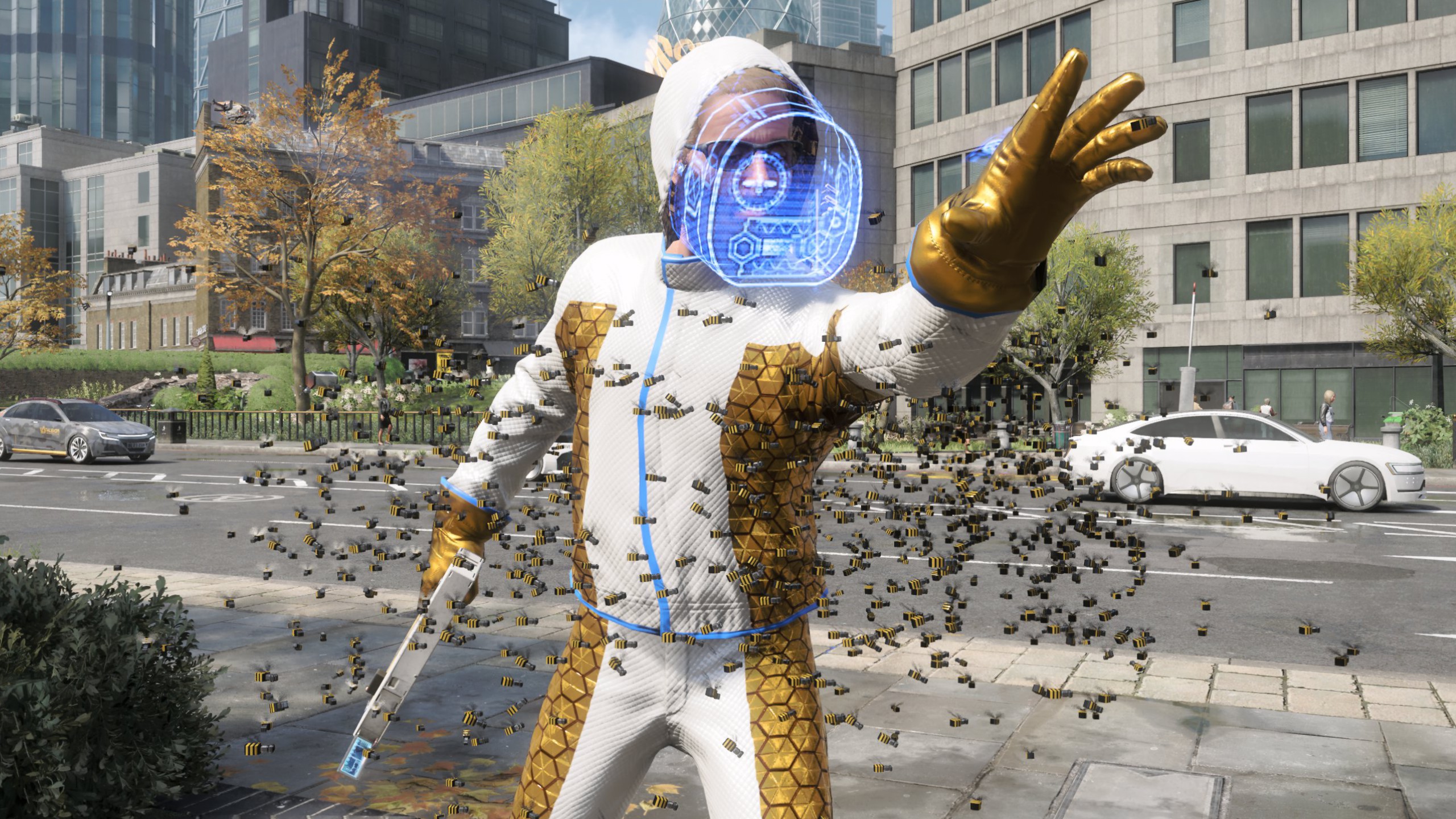
And there are finer details to dig into. Every citizen has a bio, and I found myself obsessively scrutinizing them to help me decide who to recruit. One former cop still had contacts on the police force, which would mean less jail time for my agents. Great! But his bio told me he was an anti-vaxxer. Ew! No. A drunken brawler is an animal rights activist and donates clothing to a queer youth shelter, which is a big yes in my book. A translator only watches "heartwarming" films and uploads erotic fan fiction about members DedSec. She's currently a maybe. None of this has anything to do with how these agents operate, it's just fun flavor to get immersed in and give you a little backstory for the members of your team.
The best part of playing as multiple characters is that it frees me up in ways that playing a single protagonist never did.
Each citizen has a daily schedule and relationships with other citizens. Even enemy guards don't work 24-7. They leave their posts and walk around in civilian clothing, which is both a nice realistic detail and can provide the opportunity to safely dish out some revenge on them when they're not in heavily restricted areas (like I did with the one who kidnapped my getaway driver). While scanning a wealthy middle-aged government agent, I noticed she had a contact listed as her "Sugar Baby," and sure enough, I later saw her in a pub with her companion having a drink. From time to time you'll run into someone you've met earlier, or someone who knows someone you've met earlier: a relative, their girlfriend, their doctor. If you've helped their acquaintance, they'll know about it and have a positive opinion of you, making them easier to recruit. If you've beaten up their friend, they'll know that too and they'll dislike you. Based on your actions, Legion creates an intriguing web of connections that makes London feel like it's populated with people and not just randomly generated automatons.
Hack and slash
Like San Francisco in Watch Dogs 2, Legion's London is a nice place to spend time. I've never been to the actual London myself, though from what I'm hearing from some of my British coworkers playing is that it's faithful enough to the real place to navigate without checking the map, while condensing the city and taking liberties here and there.
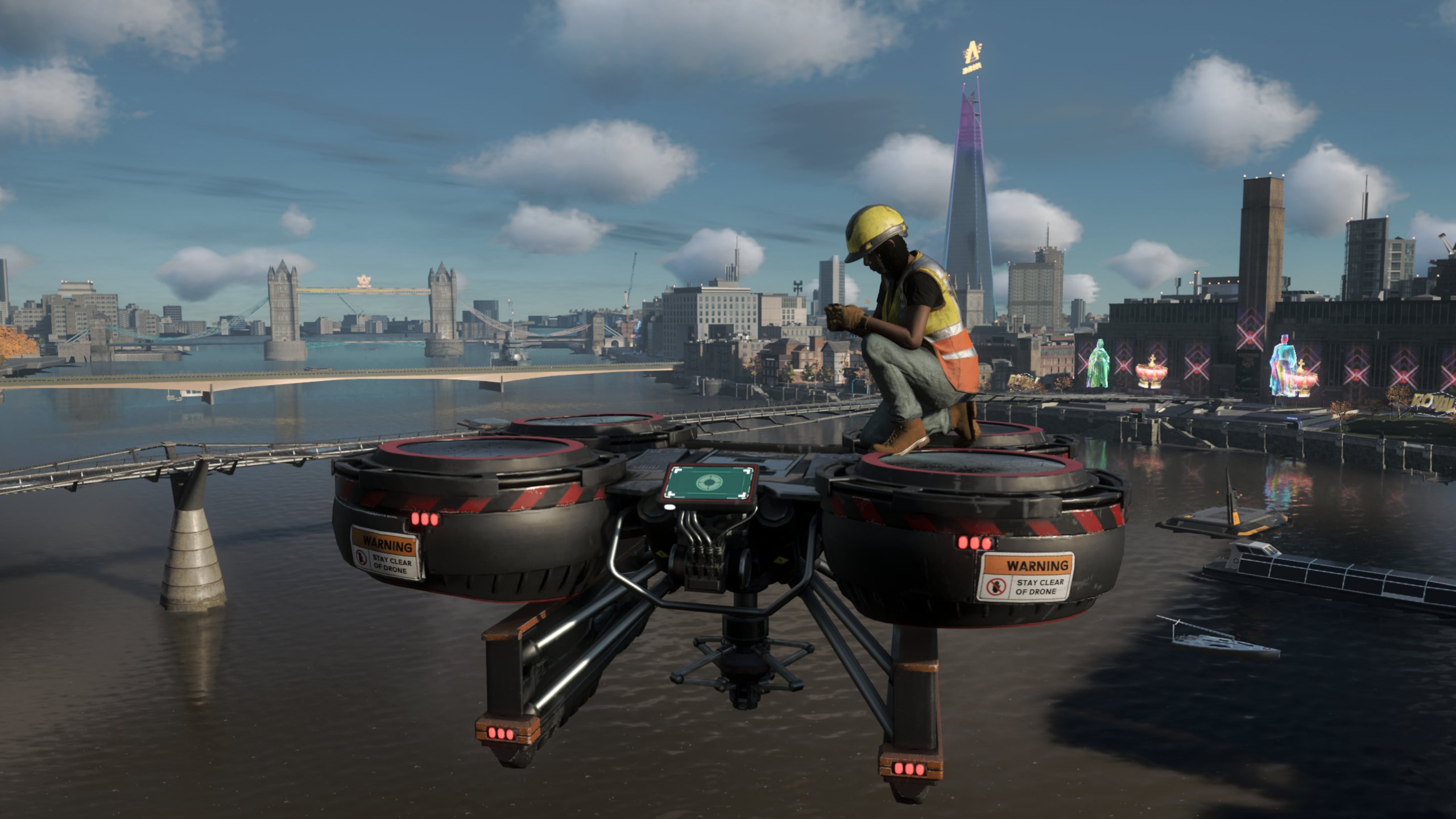
Most missions in Legion's open-world are pretty similar: stealthy infiltrations into secure buildings and areas filled with guards, cameras, and other security measures. While the configurations of mission areas usually aren't wildly different, it's still satisfying to virtually infiltrate a location, hacking security cameras to spy on the premises, mark the guards, absorb the layouts, and activate traps. Most mission locations can be tackled from different directions and in different ways using gadgets available to all your team members, plus whatever special skills are unique to them. I can send in a semi-creepy spiderbot to crawl through vents or a drone over the roof and into windows to disable security features, then sneak inside, performing stealth takedowns on enemies or slipping past when they're distracted.
If I don't feel like being all that stealthy, which is often the case, I can take a shortcut by airlifting my agent to the roof with a hijacked cargo drone to get as close as possible to my goal. Or I can just fight my way in with melee combat and guns. As in the earlier Watch Dogs games, it feels the best to clear an entire building of threats remotely and make off with stolen data all while standing safely outside the sidewalk. It's also hectic fun when something goes wrong, the sirens blare, the guards are alerted, and you have to engage in a big messy battle to escape.
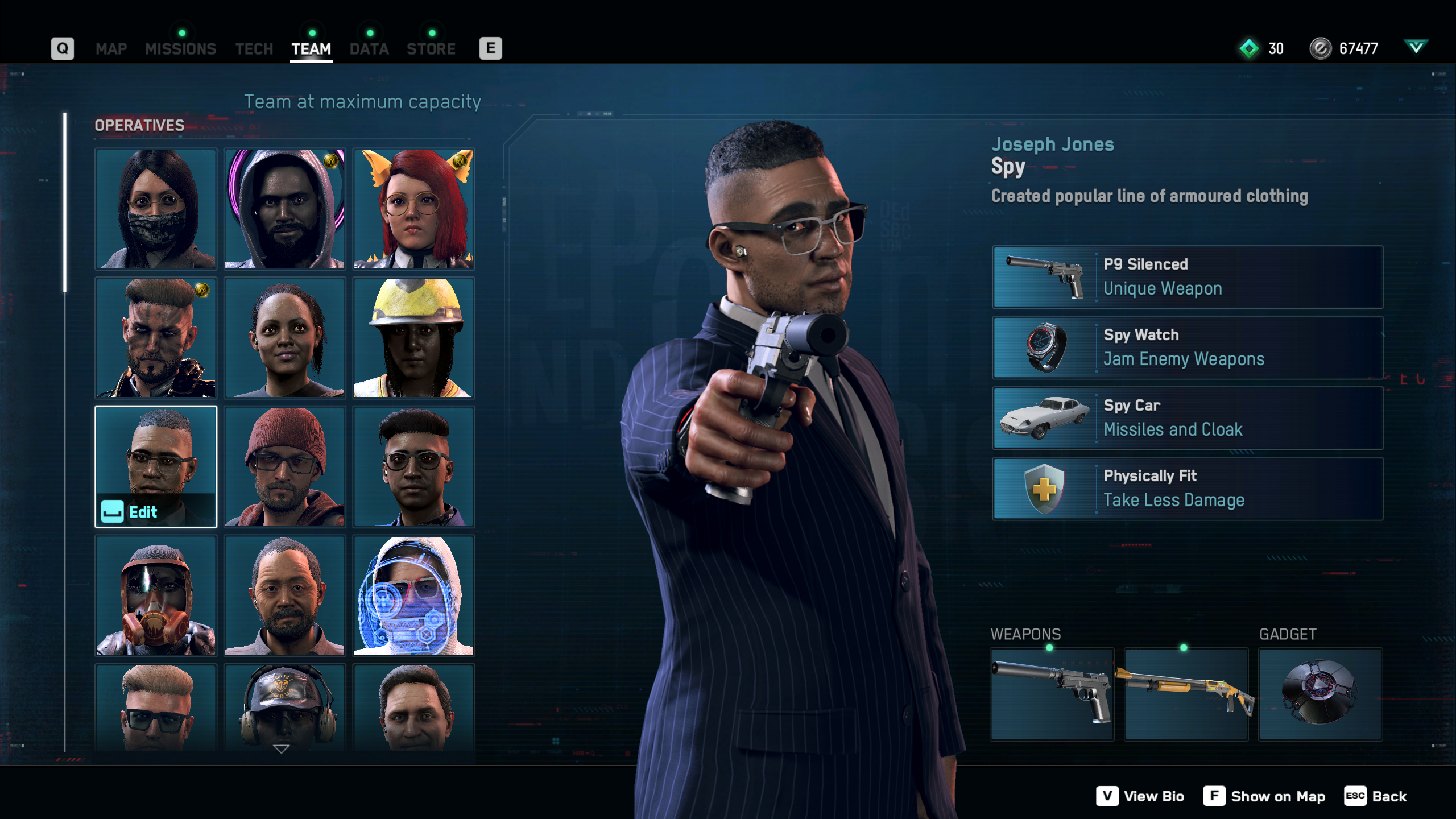
The best part of playing as multiple characters is that it frees me up in ways that playing a single protagonist never did. For instance, it was always jarring in Watch Dogs 2 when I killed someone while playing as Marcus Holloway, and it seemed bizarre for the charming protagonist to even have a gun. Holloway was such a good guy that even killing someone accidentally felt out of character, let alone going on a blood-soaked rampage.
"Ludonarrative dissonance" is the far-too-fancy term coined by developer Clint Hocking to describe moments when a game's story contradicts its gameplay, like Holloway driving over crowds of innocent people or shooting cops in the head before having another witty and charming cutscene conversation. So it's suitable that Hocking, Watch Dogs Legion's game director, avoids that entire issue here. Depending on the mission and my mood, I can pick someone from my team to be a hero, an opportunist, or a complete and utter bastard without having to cram all those attributes into a single character's head.
Initially, my crew was largely non-lethal types, but it's not long before I start dropping bodies using other characters. I recruit a former MI6 spy to my roster, armed with a silenced pistol and a cool watch gadget that lets him jam enemy weapons. He's a James Bond type who wouldn't give a second thought to headshotting any guards that get in his way. That's just part of the gig. I've got a professional hitman on my squad, too, who I recruited after following him around at night and witnessing him stabbing some unfortunate citizen to death in a park. I even recruited a member of Albion, whose uniform lets me wander around secure buildings without drawing too much attention. She doesn't seem the type to worry too much if someone gets riddled with bullets or dies in an explosion, either. Killing with those agents feels perfectly in character, and then I can swap to someone else if I want to return to non-lethal tactics.
Drone Zone
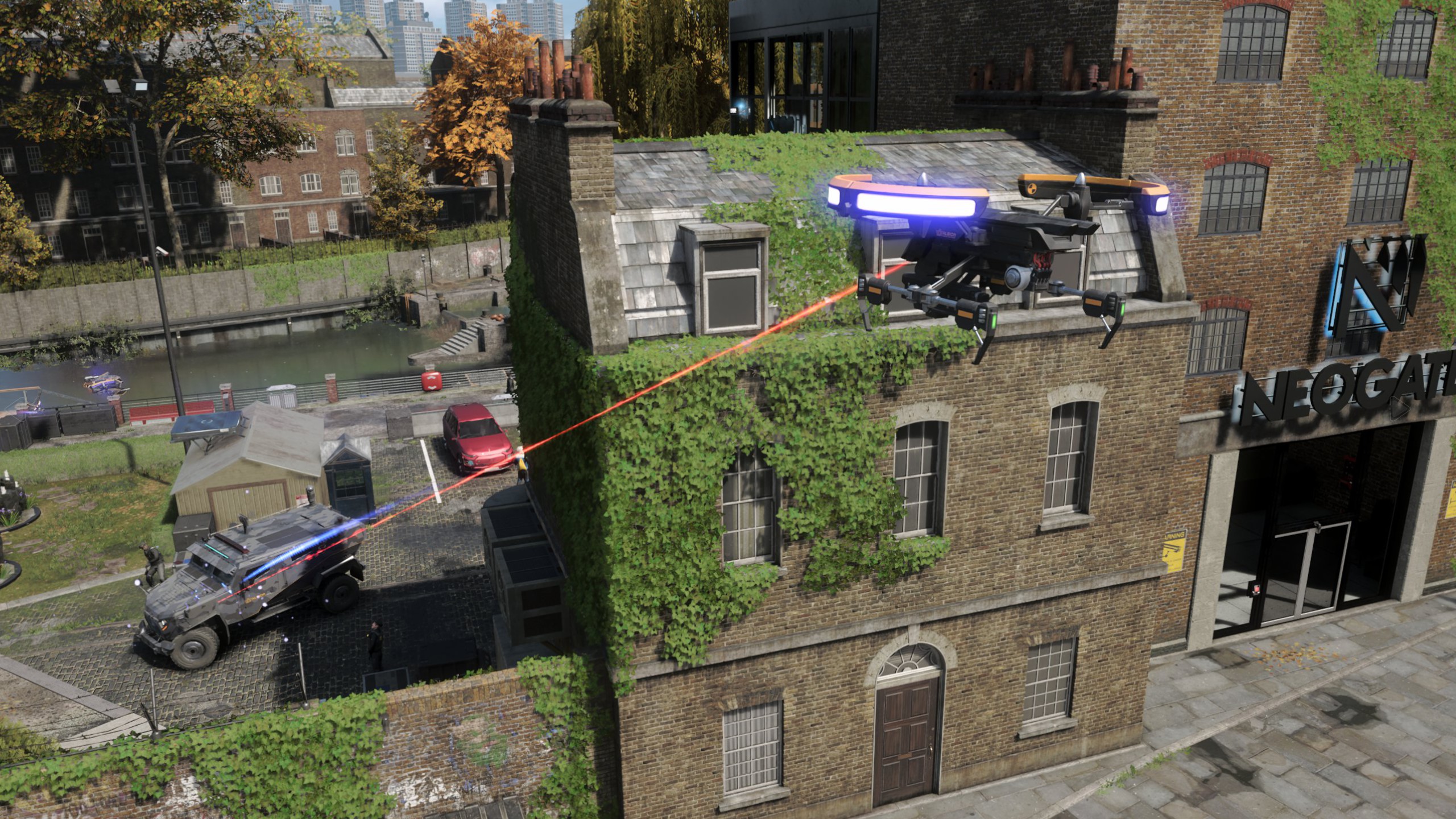
Just as it took me a few hours to start appreciating my team, it took me a while to warm up to the sheer number of drones in Legion. Drones are everywhere, unleashed by soldiers when you're detected, sent after you while you're fleeing in a car, blasting you with bullets and tear gas and rockets when you're desperately trying to hack into a server or download some data. I hate fighting drones—they're basically like giant flying insects, one of my least favorite enemy types. At one point in Legion I was piloting a drone while trying to protect a friendly drone from being attacked by swarms of enemy drones. Legion really goes all in on drones, and for a while I couldn't stand it.
I am a drone convert.
But as I unlocked more skills for my team, my anger at drones slowly turned into appreciation because I could disable them, hijack and pilot them, and even turn their AI against my enemies. Now, overhearing a soldier say he's sending a drone out to look for me is music to my ears. Dude, you're just giving me another weapon to destroy you with. If the bad guys don't send drones after me I'll hijack any random ones flying around the area instead. I am a drone convert.
I even have a drone expert on my team, a guy named Fallon. He can summon his own drone, which can be remotely piloted to deliver electric shocks that KO most enemies with one blast. He can also chuck a second drone into the air that will divebomb and incapacitate a targeted enemy. Plus, my unlocked team skills let him disable one enemy drone, commandeer a second one, and tell a third to fight for him on autopilot. That's five different drones Fallon has access to within a few seconds in a single fight. Drones went from being a nuisance to the centerpiece of my infiltration and combat strategy, and Fallon became the star of my team. He's basically my protagonist now, since I use him far more than anyone else. It doesn't hurt that he's an amazing-looking guy as the result of random generation: his head covered in spikes, his face and ears filled with dozens of piercings and studs, plus a big bushy gray beard, facial tattoos, and black lipstick to round it all out. I think I like Fallon even more than I liked Marcus Holloway.
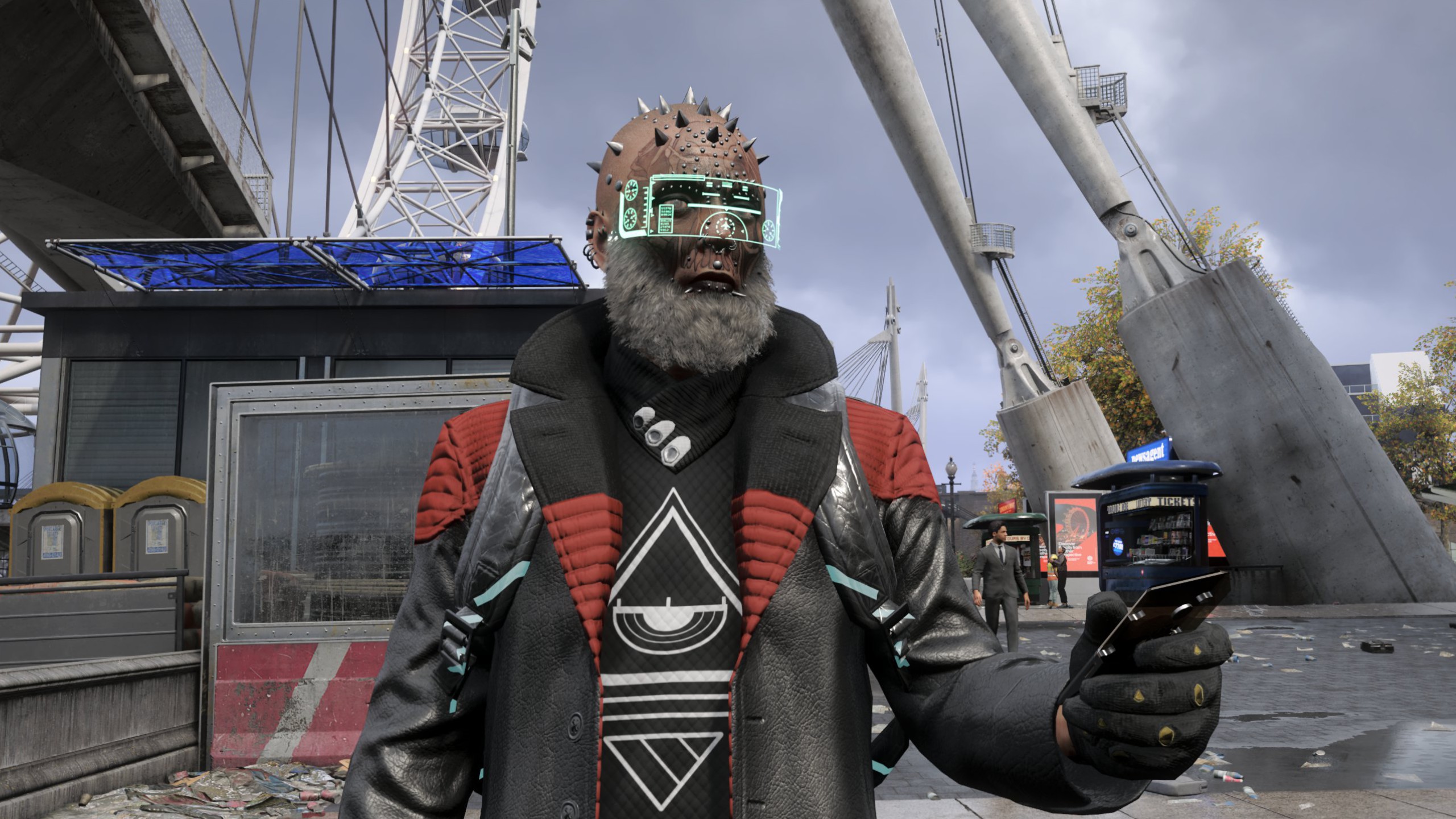
Unfortunately, I didn't warm up to the Pipe Mania-style puzzles that are a major activity in Legion, in which you complete a circuit by spinning a bunch elbow-segments into the correct configuration (most recently seen in Half-Life: Alyx). Legion does a few novel things with these puzzles, like stretching them across the front of a mansion or looping them around several floors of a skyscraper, so you need to pilot drones, hack cameras, or run a spiderbot around to figure out how to complete them. But they still get tiresome because they're used so damn often—they're even a part of several boss fights. Do you want to solve a Pipe Mania puzzle while being attacked by scores of soldiers and drones? I didn't.
I never really got into the story, either, which is almost entirely related to you by Bagley, DedSec's fast-talking, deeply sarcastic AI who briefs you before missions, during missions, after missions—he's not as bad as some chattering robots I could name, but he never really shuts the hell up. Since you're playing as any one of your team members rather than a main character, there's little in the way of meaningful interaction with Bagley—pretty much everything he suggests is A-OK with whichever character you're inhabiting at the time. There's a single choice to be made during the main campaign, otherwise, you're just following a to-do list, completing objectives, and being agreeable.
There's also very little nuance to the collection of big bad bosses: they're basically just sneeringly evil types. There's the Albion chief who murders someone during a meeting just to reinforce how darn dastardly he is, the unrepentant gangster running an organ harvesting operation, and the mysterious leader of Zero Day operating under the familiar "To save this city I must first destroy it" doctrine, which I think was used in more than one Batman movie. The mystery of Zero Day isn't particularly engaging, but it did have me guessing (wrongly, in fact) who was behind it all, so that's something.
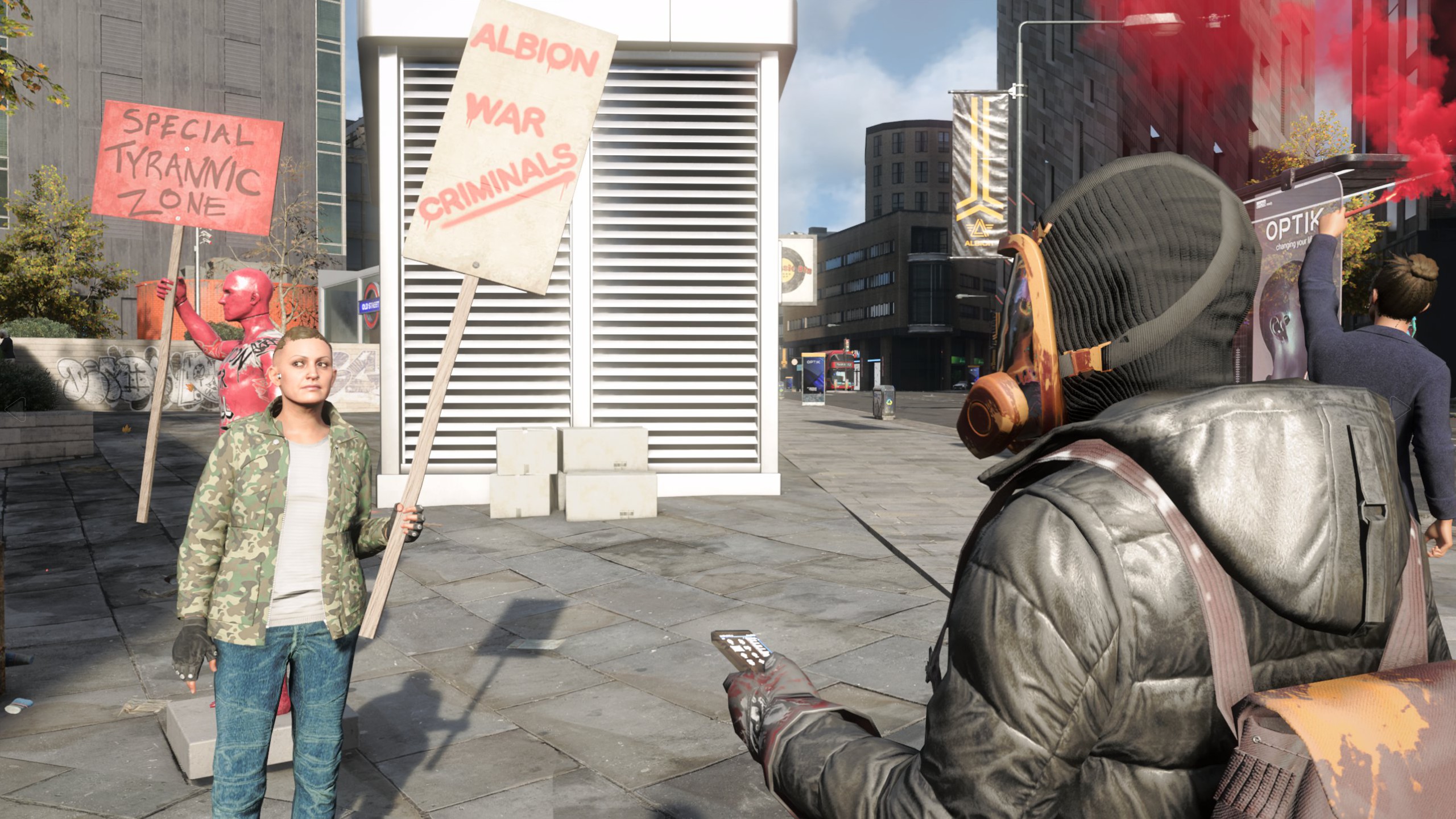
And yes, there are a few moments in Legion that present a political point of view. You'll see street protesters railing against the ultra-wealthy, out of work citizens talking about automation taking away their jobs, and people decrying police (Albion) brutality, which aren't the most radical or novel criticisms except that, as we've seen more and more lately, there are plenty of people somehow in favor of those things. There are also a few specific missions to aid undocumented immigrants, like busting them out of jail or providing them with fake passports so they can remain in London. One mission even has you reroute an airplane to prevent illegally detained citizens from being deported. There's not really a strong, cohesive political message running through the game, and definitely it's not an examination of these real issues, but Legion at least feels pro-immigration.
I didn't run into any major technical issues, and Legion ran pretty smoothly with a mixture of high and very high settings on my GeForce RTX 2080, apart from some occasional dips in framerates after a few hours of continuous play and one crash that meant I had to replay a late-game mission. There's a considerable bit of jank when it comes to AI pathfinding and physics, though it did sometimes lead to comical moments when a car would bounce around as if it were on springs or an NPC would get stuck in a doorway. I completed the main storyline and some sidequests in about 30 hours, while still leaving plenty undone, like collectible-hunting (get ready for another Ubisoft map filled with icons) and other side missions. And there's lots of fun to be had just messing around in the city of London, causing chaos by remote controlling vehicles, endlessly scanning citizen data for your next favorite operative, or breaking into secure areas just to see what's in them, even without a mission to follow.
Watch Dogs Legion's play-as-anyone gamble just about pays off. Most of London's citizens are way too ordinary to be much fun, but the few I grew to care about wound up feeling more important to me than most videogame protagonists ever do. Not bad for a group of randomly generated misfits. And I even wound up loving all those drones.
Playing as anyone works great in Legion—once you've finally found the right group of anyones.

Chris started playing PC games in the 1980s, started writing about them in the early 2000s, and (finally) started getting paid to write about them in the late 2000s. Following a few years as a regular freelancer, PC Gamer hired him in 2014, probably so he'd stop emailing them asking for more work. Chris has a love-hate relationship with survival games and an unhealthy fascination with the inner lives of NPCs. He's also a fan of offbeat simulation games, mods, and ignoring storylines in RPGs so he can make up his own.
